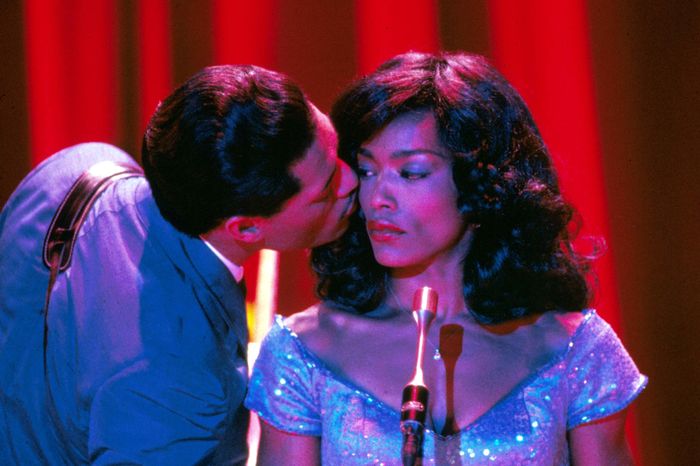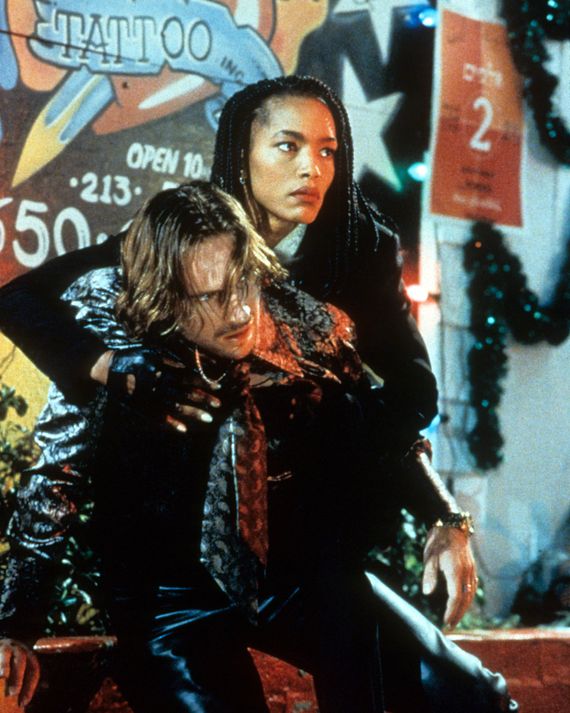
Angela Bassett knows her angles. It’s evident in a crucial early scene in the romantic drama Waiting to Exhale, in which Bassett’s Bernadine sets fire to her soon-to-be ex-husband’s car, packed densely with fine suits and the shoes he cared for with such focus. This scene — specifically, the moment when Bernadine walks away from the wreckage she sparked, her back to the flames licking the Arizona sky behind her, one hand on her hips, eyes flinty, and jaw held tight — has been memed within an inch of its life. Memes can act as celebration, visual shorthand, a straight shot of emotional communication. But they can flatten the more prickly dynamics of the work from which they were born. Those few seconds of anguish fluttering through various internet conversations and text messages fail to express why we so often return to the movie: Bassett’s unmatched ability to portray the interior complications and cultural reverberations of Black women’s anger.
Over the course of her career, since it began with TV stints in 1985, Bassett has become a vision for the glory of Black womanhood, instantly telegraphing regality and power in films like Black Panther and its cumbersome sequel. Between appearing in early TV projects like Spenser: For Hire and the success of Wakanda Forever, she made waves in boldly constructed biopics like Malcolm X, measured science fiction like Contact, lasciviously demented horror-comedy like Vampire in Brooklyn, and too-slick TV fare like American Horror Story and 9-1-1, imbuing each of her characters with a fiercely won interiority. Her 2023 Best Supporting Actress Oscar nomination felt less like a recognition of her performance in the Marvel behemoth and more like a commemoration of the work she has done since the Oscars failed to recognize her when she was first nominated in 1993.
Three decades later, the Academy once again gave the statue to someone else. Bassett’s reaction to losing the award to Jamie Lee Curtis constituted less than ten seconds of the laborious 2023 Oscars broadcast, but that’s all it takes to spur another meme. In the clip that made its way to social media, Bassett’s expectant nervous energy gives way to a soft sadness when Curtis’s name is announced. Bassett does not stand from her seat or clap heartily. She does not perform gratitude in the face of obvious disappointment. She remains a woman self-possessed — as she has been called to be onscreen so many times.
Bassett’s skills have often been construed on lines of strength and intellect. Yes, her characters are strong and intelligent and refuse to bend fully to the whims of others in order to retain possession of themselves. But to acknowledge Bassett for simply excelling at portraying strong Black women is a disservice. Strength is often a bind for Black women. It’s an expectation thrust upon us. What Bassett has been able to do with anger, an emotion rarely afforded to Black women in life or onscreen, is the real meat of her career. She is the Black actress in mainstream U.S. cinema to most consistently portray anger with the care and complexity such a depiction deserves.
It all begins with that 1993 Oscar-nominated performance in What’s Love Got to Do With It. Bassett, who was in her mid-30s at the time of filming, plays Tina Turner from a naïve and yearning 19-year-old to a woman stepping deeper into her 40s and a new chapter of her career as a rock star. The film is rote in the way biopics far too often are. It’s visually flat with all of the panache of a TV movie from that era. What gives it life are Bassett and Laurence Fishburne, who plays Ike Turner as a malevolent wrecking ball.
Here, Tina is a woman defined almost entirely by her talent and victimhood. Bassett channels the ecstasy of her onstage bravado and lip-syncs to the songs the real woman rerecorded for the film, demonstrating a kind of ease that belies the effort necessary for such a performance to finally hit us in the gut. It’s at the very end of the film, just as Tina is preparing to go onstage at the Ritz Theatre, when Ike walks into her dressing room with insults and degradation dripping from his lips. Bassett seethes with tense understanding immediately. “You thought a nigga like me was gonna let you get away from me?” he says. But she’s not afraid — not even when he brings out a gun. Instead, she simmers with the kind of rage that accumulates over years of neglect and abuse. “That’s supposed to scare me? … Do what you want to do, Ike. I don’t care.” The twin flames of self-possession and fury flicker across Bassett’s face in the mirror — her temper never fully erupting and her gaze never wavering. Tina could have easily ended as an exaggerated representation of trauma in this film, but Bassett imagines her with a perfectly calibrated center of gravity.
Of course, anger can be accepted from women in certain circumstances, and being beset by great abuse is one of them. But in the 1990s, Bassett returned again and again to the emotion, teasing out its splendor, refusing to let it tumble into distortion, in a variety of scenarios. Two years after What’s Love, she appeared in Waiting to Exhale, which was, in many ways, the kind of film the ’90s excelled at: a charming mid-budget romance, in which stars were made and careers took root. Directed by Forest Whitaker, the film adapts Terry McMillan’s best-selling novel concerning the lives of four good friends played by Whitney Houston, Loretta Devine, Lela Rochon, and Bassett. Bassett’s Bernadine Harris is the kind of woman who put her life on hold to support the dreams of her husband, John (Michael Beach), acting as his confidante and business partner, and who, as the mother of his children, keeps the household functioning with what seems to be machinelike precision but is really just the harried response to an expectation foisted on her.
Less than five minutes into the film, Bassett appears in front of another mirror, this time brushing her hair in preparation for one of her husband’s work events, when he says, “I guess there’s no appropriate time to tell you this, but I’m going to the party — just not with you.” “It’s that bitch who keeps your books, isn’t it?” she responds. “I’m leaving you for her,” he admits. Bassett’s composition changes in a tight close-up. Her face glints, first with shock, then with the stunning realization that her life is about to be upended. Her nose flares. With minute twinges, it’s clear what she has building to. She swings around, away from the mirror: “I give you 11 fucking years of my life, and you’re telling me you’re leaving me for a white woman?” There’s an urgency to her anger — down to the moment she insults her husband’s Blackness. The way she spits fucking at him.
Whitaker as a director relishes Bassett in close-up, to better study the grooves of her character’s internal life, reflected in her jaw going tight or a tilt of her head up to the sunlight. Consider a touch later in the film, when Bernadine storms into her husband’s office during a work meeting that’s 12 people deep. (All white people, for the record.) Her heels click against the floor with rhythmic intensity. Head held high and without hesitation, she backhand slaps the white woman (Kelly Preston) who decided she was about that life, then directs her attention to John. In the final line of a barrage of slights, Bassett grants us a keen picture of what’s driving Bernadine. “Hell, I’m not worried.” There’s a flutter in her voice. She’s winding us up for the threat of the final line. “You, on the other hand, should be.” It isn’t just the bottomlessness of her gaze or her controlled physicality that makes this line reading moving. It’s her voice. There’s a cadence of grace to Bassett’s voice — whether she’s hot with malice or cooled toward frustration. It dips, stretches words, mellifluously rises and falls, turning even banal dialogue into a moment of revelation. When she says those two lines — “Hell, I’m not worried. You, on the other hand, should be,” — the threat isn’t on the surface. It’s in all of that hurt underneath and what it can transform into.
But Bernadine wasn’t even Bassett’s best performance that year. That came in Kathryn Bigelow’s Strange Days, a cyberpunk vision of Los Angeles at the edge of the new millennium, co-written by James Cameron. Here, 1999 L.A. is a war zone of grime and glitter. Police violence has the streets running red with blood — including with that of revolutionary rap artist Jeriko One (Glenn Plummer). Ralph Fiennes leads the film as Lenny Nero, a former LAPD officer turned black-market dealer of what is essentially memories. In this world, there’s a device known as SQUID, in which people’s thoughts can be recorded, played back, and obsessed over for the right price. Lenny gets caught up in a hellish ordeal after stumbling on a SQUID recording that contains the the truth of Jeriko One’s murder at the hands of cops, and he turns to one of his closest friends, Lornette “Mace” Mason (Bassett), a bodyguard and limousine driver with a box-braid bob, crimson lips, and the sharpest of suits.
If Bassett wielded anger like a machete in Waiting to Exhale, in Strange Days she holds on to the emotion like a surgeon grasps a scalpel. In her greatest scene, Mace is rebuffing Lenny’s desire to go to a New Year’s Eve party, knowing it’s a setup that is destined to get him killed. “Shut up, Lenny. Park your mouth and listen,” Bassett says. “You gonna get yourself killed for this? Huh?” She grabs his stash of SQUID memories featuring an ex who has long stopped loving him. Mace’s anger is building. First it was irritation, but now it has gained energy. She throws the recordings against a wall and rushes to stomp on them with well-healed force. When Lenny tries to recover them from under her boot, she pushes him against the wall. A roiling boil becomes a crescendo of emotion: “This is your life! Right here, right now.” Her unrequited love for Lenny — her hope that he’ll remake his life instead of trying to live in the past — pours out. Mace is a sterling vision of Black women’s anger unbound to propriety, embodying what such anger can inspire or reflect. “These are used emotions. Memories were meant to fade, Lenny. They’re designed that way for a reason.” With that last line, her voice becomes a wisp of dialogue. Her eyebrows are furrowed, eyes pleading. “You ever been in love with someone who didn’t return that love?” Lenny asks. Her voice drops even deeper into a resentful whisper: “Yeah, Lenny. I have.”
To be angry, and allowed anger as an expression, is to reveal something hidden, soft about yourself: the hairline triggers in your soul. The secretive markers of our humanity — what moves us, what excites us, what moral lines we’re bound within. At its best, anger is an emotion that acts as a vehicle for change — personal and political, quiet and cultural. In the hands of other artists, however, Black women’s anger is nullified through caricature and emotional distance. The American imagination is cruel like that, and how can a fictional character be truly permitted anger when Black women in this world are not?
More recently, films like Wakanda Forever have traded on Bassett’s reputation for communicating an intense, unbending grace but have ultimately failed to give her parts that rise to face the righteousness of Black anger. Bassett’s performance as Queen Ramonda is an emotional ballast for a heavy story, in which she is forced to carry the cresting waves of tragedy to its proper shores.
After the Wakandans get their asses handed to them and Okoye (Danai Gurira) loses Princess Shuri (Letitia Wright) to Namor (Tenoch Huerta), Okoye finds herself stripped of her military rank — a loss on top of loss on top of loss. “I have given everything,” Okoye says with tears welling in her eyes. “Let me die serving this country.” Bassett’s voice begins measured, the kind of register that causes you to lean in to listen: “Make it right? I don’t know if my daughter is alive or dead.” When another elder notes that Okoye raised a spear to her own husband and deserves grace, Ramonda is unmoved. “Where is her treacherous husband now but in a place where she can visit if she wished? Mine is with the ancestors. I am queen of the most powerful nation in the world, and my entire family is gone! Have I not given everything?” Bassett’s voice raises from its balanced tone into a full-blown bellow as she rises from her seat. What was once held back now radiates in the flinging of her arms. Ramonda refuses to see that she’s not the only one in pain in that room — that her pain, no matter how great, doesn’t nullify anyone else’s. Bassett’s swelling of need almost makes you forget how terribly Ramonda is written — a monarch consumed by grief who makes slapdash and inconsiderate choices that threaten the lives of those she is meant to rule.
Bassett’s refusal to mask her dismay at once again losing the Oscar for her crucial part in Wakanda Forever will reverberate online until the complications of the situation are lost in the echo. But it’s worth remembering that at the same ceremony, Bassett’s Gunpowder Milkshake co-star Michelle Yeoh was awarded the Best Actress statue for her role in Everything Everywhere All at Once — a part that allowed the Hong Kong superstar to pull from her genre-spanning history onscreen and unabashedly flex. The bigger disappointment from that night is not simply that Bassett remains unrecognized by the Academy but that she has not yet been offered a role like EEAAO — one that affords her the same unfettered opportunity to mine the depths of a talent Hollywood has forgotten how to foster.




